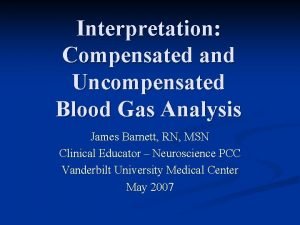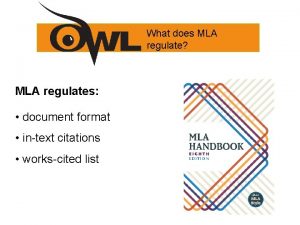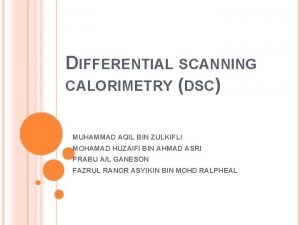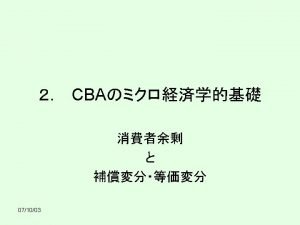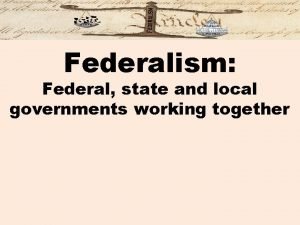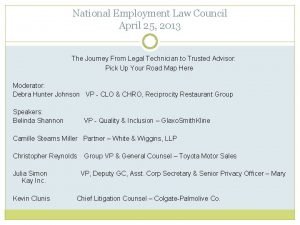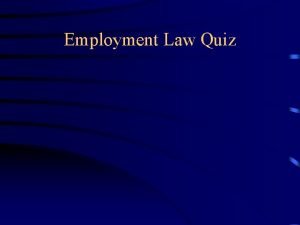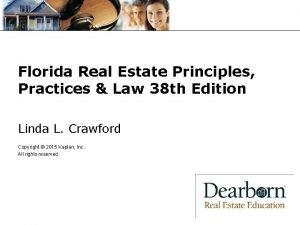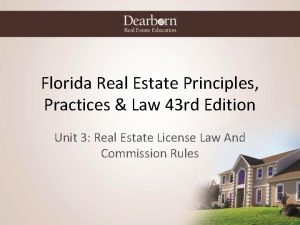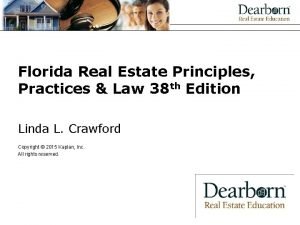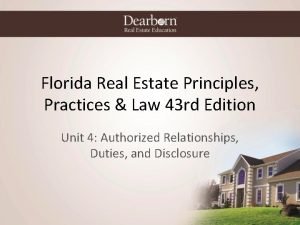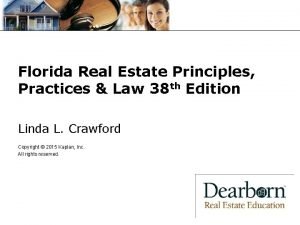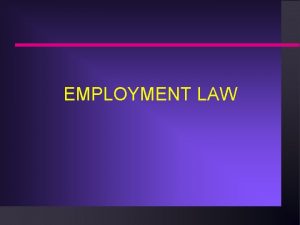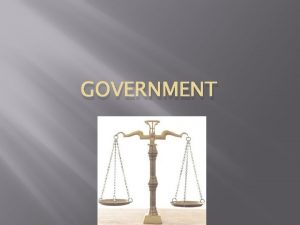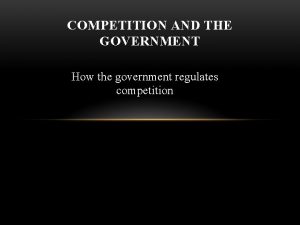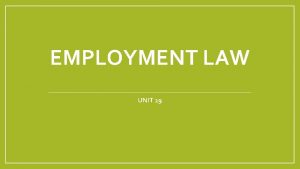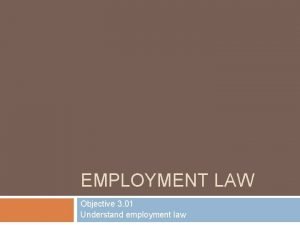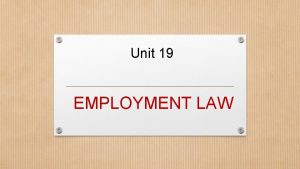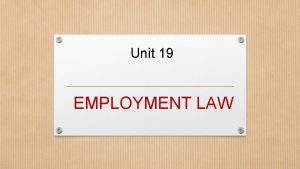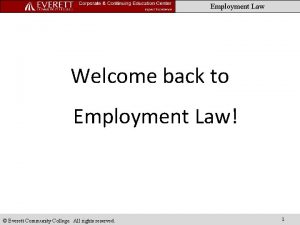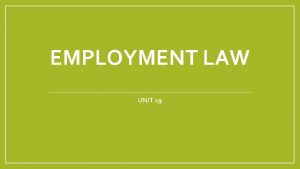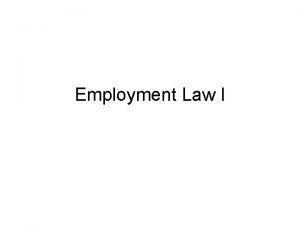EMPLOYMENT LAW Government regulates employment practices Selected Compensated

































- Slides: 33

EMPLOYMENT LAW

Government regulates employment practices: • • Selected Compensated Benefits Accommodate Children Disabilities Terminated

Why understand HR Law? 1. Doing the Right Thing 2. Limitations 3. Liabilities

EMPLOYMENT AT WILL

NINE DON’TS OF INTERVIEWING 1. 2. 3. 4. 5. If they have kids Age Disability Height, Weight Maiden name 6. Arrest records, been convicted 7. Smokes 8. AIDS, HIVPositive 9. Religion

1. Consistent incompetence. 2. Violation of company policy • • • 3. Repeated unexcused absenteeism/tardiness 4. Physical violence 5. Drug and alcohol 6. Illegal acts 7. Falsified Information

WORKERS COMPENSATION

OSHA • OCCUPATIONAL SAFETY AND HEALTH ADMINISTRATION • Conducts inspections and investigations

FMLA • FAMILY AND MEDICAL LEAVE ACT

FAIR LABOR STANDARDS ACT 1. 2. 3. 4. Minimum wage Time and a half (“overtime”) Children; 14 18

UNEMPLOYMENT COMPENSATION “BENEFITS”

WARN • Worker Adjustment and Retraining Notification Act • 60 days • Unforseeable

SOCIAL SECURITY ACT • DEATH • DISABILITY • RETIREMENT

SO…. THAT’S WHAT THAT IS? • FICA

• ERISA

EQUAL EMPLOYMENT OPPORTUNITY EMPLOYER • • • RACE RELIGION COLOR NATIONAL ORIGIN AGE SEX MARITAL STATUS DISABILITY SEXUAL ORIENTATION VETERAN STATUS LEGALLY PROTECTED CLASSES

AFFIRMATIVE ACTION

BFOQ • BONA FIDE OCCUPATIONAL QUALIFICATION

• DISPARATE TREATMENT • VS. • ADVERSE DISPARATE IMPACT

AMERICANS WITH DISABILITIES ACT REASONABLE ACCOMMODATIONS

THE EQUAL PAY ACT (1963) • SEXES

ADEA 40 AND OLDER

Discrimination and Harassment • • Words Signs Offensive jokes Cartoons Pictures Posters Email jokes • Pranks • Intimidation • Physical assaults or contact • Violence • Derogatory statements

Unwelcome sexual advances, requests for sexual favors, or other verbal or physical contact of a sexual nature. SEXUAL HARASSMENT

SEXUAL HARASSMENT 1. QUID PRO QUO 2. HOSTILE WORK ENVIRONMENT

THE FEDERAL PRIVACY ACT • It gives government employees the right to know what is in their employment file, to restrict access to their files, and to fix any mistakes they might find in their files.

THE DRUG-FREE WORKPLACE ACT • Fourth Amendment • Some states have passed statutes that regulate drug testing in the private sector.

THE EMPLOYEE POLYGRAPH PROTECTION ACT • No lie detectors • It also prohibits RANDOM testing of employees. • Exceptions: security, controlled substances, drug firms, private investigators.

Why do companies need written policies?

Common written policies and rules: 1. Salaries, wages, and benefits. 2. Attendance, absences, and punctuality. 3. Leave – sick leave, vacation time, jury-duty leave, maternity leave, military, *bereavement. 4. Work schedule and records, breaks, overtime. 5. Expenses and reimbursement. 6. Due process. 7. Probation and review. 8. Electronic Acceptable Use Policy 9. Sexual Harassment 10. Dress code

• UNION - Promote the welfare of its members. • COLLECTIVE BARGAINING

STRIKE VS. LOCKOUT

UNION LAWS • THE NORRIS-LAGUARDIA ACT (1932) • THE WAGNER ACT (1935) • THE TAFT-HARTLEY ACT (1947) • THE LANDRUM-GRIFFIN ACT (1959)
 Compensated vs uncompensated
Compensated vs uncompensated Mla format regulates
Mla format regulates Newton's first law and second law and third law
Newton's first law and second law and third law Newton's first law of motion
Newton's first law of motion Boyles law
Boyles law Avogadro's law constants
Avogadro's law constants Pneumatic flow control valve symbol
Pneumatic flow control valve symbol Motion compensated platform
Motion compensated platform Example of respiratory acidosis
Example of respiratory acidosis Compensated shock
Compensated shock Ahmad aqil bin zulkiflee
Ahmad aqil bin zulkiflee Fully compensated abg
Fully compensated abg Compensated shock
Compensated shock Compensated demand
Compensated demand Clvds
Clvds Precapillary sphincter contraction
Precapillary sphincter contraction Liver defination
Liver defination National government vs federal government
National government vs federal government National employment law council
National employment law council Employment law quiz
Employment law quiz Employment law alliance handbook
Employment law alliance handbook Florida real estate principles practices & law
Florida real estate principles practices & law Involuntary inactive real estate license florida
Involuntary inactive real estate license florida Ostensible partnership real estate
Ostensible partnership real estate Florida real estate principles practices
Florida real estate principles practices Florida real estate principles practices & law
Florida real estate principles practices & law Qualitative vs quantitative data analysis
Qualitative vs quantitative data analysis K selected species survivorship curve
K selected species survivorship curve Types of selected response assessment
Types of selected response assessment Qualitative and quantitative research
Qualitative and quantitative research Vba combobox selected item
Vba combobox selected item K selected species survivorship curve
K selected species survivorship curve Example of r selected species
Example of r selected species Weights of the backpacks of first graders on a school bus.
Weights of the backpacks of first graders on a school bus.
